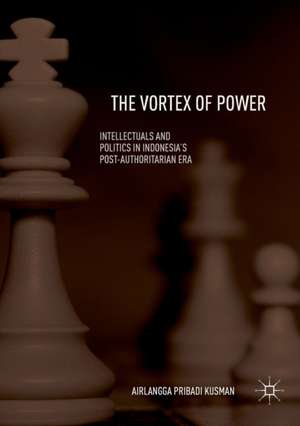The Vortex of Power: Intellectuals and Politics in Indonesia's Post-Authoritarian Era
Autor Airlangga Pribadi Kusmanen Limba Engleză Paperback – 23 dec 2018
This book explores the role of intellectuals and governance processes in post-authoritarian Indonesia. Focusing on East Java, the author argues that intellectuals have played an increasingly direct and practical role in the exercise of governance at the local level of Indonesian politics.
The book provides insights into how the collaboration between intellectuals and local politico-business elites has shaped good governance and democratic institution-building, validating power structures that continue to obstruct political participation in the country. In addition, the book also delves into the contribution of local intellectuals in resolving the contradictions between technocratic ideas and governance practices, in the interest of local elites.
Empirical studies included in the book add to the broader literature on the social role of intellectuals, highlighting their role as not just defined by their capacity to produce and circulate knowledge, but also by their particular position in concrete social and political struggle. The author also explores the manner in which relationships between intellectuals, business and political elites and NGOs in local political and economic practices, intersect with national-level contests over power and resources.
| Toate formatele și edițiile | Preț | Express |
|---|---|---|
| Paperback (1) | 451.48 lei 43-57 zile | |
| Springer Nature Singapore – 23 dec 2018 | 451.48 lei 43-57 zile | |
| Hardback (1) | 586.55 lei 43-57 zile | |
| Springer Nature Singapore – 28 iul 2018 | 586.55 lei 43-57 zile |
Preț: 451.48 lei
Nou
Puncte Express: 677
Preț estimativ în valută:
86.42€ • 93.90$ • 72.64£
86.42€ • 93.90$ • 72.64£
Carte tipărită la comandă
Livrare economică 21 aprilie-05 mai
Preluare comenzi: 021 569.72.76
Specificații
ISBN-13: 9789811343438
ISBN-10: 9811343438
Pagini: 286
Ilustrații: XI, 272 p.
Dimensiuni: 148 x 210 x 15 mm
Greutate: 0.35 kg
Ediția:Softcover reprint of the original 1st ed. 2019
Editura: Springer Nature Singapore
Colecția Palgrave Macmillan
Locul publicării:Singapore, Singapore
ISBN-10: 9811343438
Pagini: 286
Ilustrații: XI, 272 p.
Dimensiuni: 148 x 210 x 15 mm
Greutate: 0.35 kg
Ediția:Softcover reprint of the original 1st ed. 2019
Editura: Springer Nature Singapore
Colecția Palgrave Macmillan
Locul publicării:Singapore, Singapore
Cuprins
1. Introduction.- 2. Intellectuals and the Politics of Good Governance: Theoretical Considerations.- 3. Historical Context of the Relationship between Intellectuals and the Political Elite.- 4. The Windfall of Post-authoritarianism.- 5. Building a New Political Structure in Post-authoritarian East Java: The New Role of Intellectuals.- 6. Intellectuals in the Rebuilding of Political Power in Post-authoritarian Indonesia.- 7. Intellectuals and Disorganised Social movements in East Java: The Lapindo Mudflow Case.- 8. Conclusion.
Notă biografică
Airlangga Pribadi Kusman is a Lecturer in Politics, Faculty of Social and Political Sciences, Airlangga University. He is also the Director of CSCS (Centre for Statecraft and Citizenship Studies), Airlangga University. He completed his PhD in Politics at Murdoch University’s Asia Research Centre. His research interests include governance studies, political economy of development, civil society and social movement studies, politics and religion studies, local politics studies and democratization studies.
Textul de pe ultima copertă
This book explores the role of intellectuals and governance processes in post-authoritarian Indonesia. Focusing on East Java, the author argues that intellectuals have played an increasingly direct and practical role in the exercise of governance at the local level of Indonesian politics.
The book provides insights into how the collaboration between intellectuals and local politico-business elites has shaped good governance and democratic institution-building, validating power structures that continue to obstruct political participation in the country. In addition, the book also delves into the contribution of local intellectuals in resolving the contradictions between technocratic ideas and governance practices, in the interest of local elites.
Empirical studies included in the book add to the broader literature on the social role of intellectuals, highlighting their role as not just defined by their capacity to produce and circulate knowledge, but also by their particular position in concrete social and political struggle. The author also explores the manner in which relationships between intellectuals, business and political elites and NGOs in local political and economic practices, intersect with national-level contests over power and resources.
Airlangga Pribadi Kusman is a Lecturer in Politics, Faculty of Social and Political Sciences, Airlangga University. He is also the Director of CSCS (Centre for Statecraft and Citizenship Studies), Airlangga University. He completed his PhD in Politics at Murdoch University’s Asia Research Centre. His research interests include governance studies, political economy of development, civil society and social movement studies, politics and religion studies, local politics studies, and democratization studies.
Caracteristici
Shows how Indonesia's intellectuals utilize the idea of good governance and democratic institution-building for private interests Highlights current forms of governance that validate power structures that continue to obstruct political participation in Indonesia Delves into the contribution of local intellectuals in resolving the contradictions between technocratic ideas and governance practices Elaborates on how the relationships between intellectuals, business and political elites and NGOs intersect with national-level contests over power and resources
